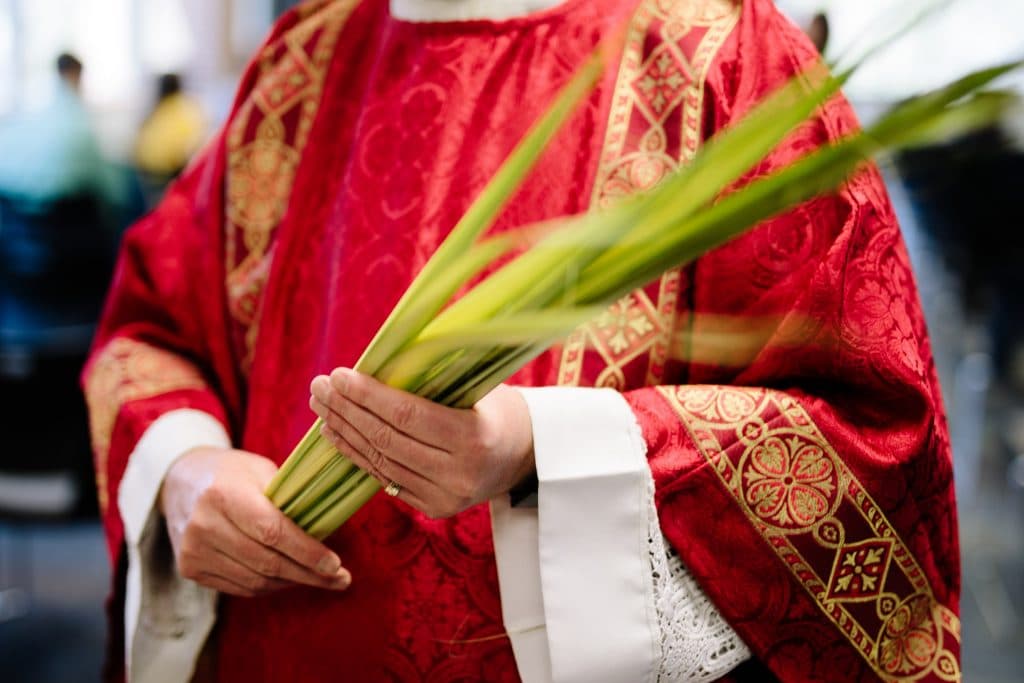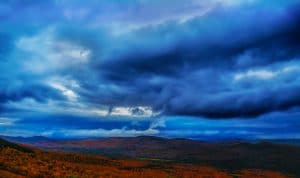What are the things that you celebrate in life? I think that when we ask that question, most people will say things like a wedding, the birth of a child, a baptism, a graduation, or events of that sort. But when we take the time to really think about it, we can observe humanity celebrating all sorts of other things.
Several years ago, I was in Scotland, and I had the opportunity to go to the Six Nations Rugby Championship. As over 60,000 Scots sang songs in unison, I experienced this really surreal moment. The particular song that I remember them singing was “(I’m Gonna Be) 500 miles” by the Proclaimers (a Scottish duo who happen to be twins). In that moment, as they sang in their marvelously thick Scottish accents, it occurred to me that human beings really do celebrate all sorts of weird and crazy things…on freakishly massive scales.

For instance, in a certain town in Spain, they have La Tomatina. You might have heard of it: the tomato-throwing festival. An estimated three hundred thousand pounds of squashed tomatoes are thrown by people at other people. This supposedly originated as an odd political protest which has now evolved into a festival purely for entertainment purposes.
But that isn’t even as strange as the event that they hold in Lopburi, Thailand: the Monkey Buffet Festival. Lest you worry, the festival title is a little misleading; it is not a buffet of monkeys, but a buffet for monkeys, featuring 8,500 pounds of fruit, vegetables, cakes, candies, and sodas. About 2000 of these monkey guests hang out around several 10th century Hindu temples. The backstory to the festival is pretty fascinating. (You should look it up if only for the pictures of monkeys drinking cans of Coke. Internet gold.)
If you think the Monkey Buffet Festival is weird, prepare to be amazed because back in Spain, there is a baby jumping festival that has been happening since 1620. Men dress up like the devil in red and yellow suits, holding whips and oversized castanets, and then run down the street jumping over real babies laid on mattresses. Supposedly, they do this to try and guard the children against illness and evil spirits and to ensure safe passage throughout life. Because the most logical way to keep your baby safe is to lay them in the middle of the street amid thousands of strangers who are dressed as devils and jump over them.
Need one more thing for your bucket list? You don’t need to fly any farther than Tinku, Boliva. There, they host the “Punch Your Neighbor” Festival where all the villagers get together to beat their neighbors in kind of blood tribute to a fertility goddess. Why? Because they believe it will bring a good harvest.
From most of our perspectives, these types of events may seem pretty outlandish. But let me ask you: how much crazier is it really than the things we celebrate? Take the most obvious American example: professional sports. Here in South Florida, we have an American football team called the Dolphins. It’s a land sport with a team named after an aquatic animal. There is a mascot of a mutant dolphin (the only dolphin in the world that has legs), and everyone loves him. The last game I attended, this mascot fell to the ground and was wiggling around sporadically. I got concerned because there’s a person in there, right? But the crowd went wild. Everyone seemed to just love it. It’s downright weird.
So whether we are committing tomato massacres, giving monkeys cavities, scaring the literal crap out of our babies, entering Bolivian fight clubs, or watching our mutant mascot self-inflict brain damage, we spend considerable time as human beings doing truly bizarre things.

All of this got me thinking about a former congregant of mine who came to me one day and wanted to tell me about a dream she had. A side note: an interesting thing about being a pastor is that lots of people come to me to tell me their dreams. I guess it makes sense because in the Bible, God often speaks to people in dreams. So God speaks to this woman regularly. She told me that since God so often speaks to her through her dreams, she started keeping a journal by her bed to write them down. She showed me pages and pages full of notes from her dreams.
In one of those dreams, she was in a huge sports stadium, far larger than a professional sports stadium, with a crowd that looked endless. The people were cheering. And in the dream, God said to her, “How come my people don’t cheer for me like this?”
Ever since that conversation, I can’t go to a single event or watch one on TV without that question on my heart. Take Palm Sunday, for instance. When we read John 12:12-16, we read of a crowd who were cheering for Jesus. Often, we’ll reenact this scene in our churches. Hosanna in the Highest! Hosanna to the Son of David! But careful what you Hosanna for.
Jesus had come to Jerusalem for the Passover, the festival when Jews celebrate when the Angel of the Lord passed over specially-marked Israelite homes, sparing their first-borns in an event leading to the liberation of the Jews from Egyptian slavery. In Jesus’ time, every adult male who lived within 20 miles of Jerusalem was required to come for the Passover, but beyond that, pilgrimages were made by Jews from all over the world. We know from historical data that roughly 2.5 million Jews had come to Jerusalem around this time. As these pilgrims came into the city, they would have been greeted with words from Psalm 118:26, “Blessed is the one who comes in the name of the Lord.”
But Jesus is no average pilgrim, and it appears by his very specific actions that he was trying to send a particular message as he entered the city. First, he is intentional about fulfilling the Old Testament prophesy of the prophet Zachariah, who says in Zachariah 9:9:
Rejoice greatly, O daughter Zion!
Shout aloud, O daughter Jerusalem!
Lo, your king comes to you;
triumphant and victorious is he,
humble and riding on a donkey.
Jews of that day would have understood the implication of this, and by this time, Jesus had developed quite the reputation. Back then, it was typical for people to cover the path in some way for someone who was considered worthy of their highest honor. But this is where things start to get nuanced, because different people in the crowd had very different motivations. We read in the Gospel parallels that people put their cloaks on the donkey and on the road. Why is that important? Mainly because this is what people did to honor royalty. We read about another instance of this in 2 Kings 9:13: “They quickly took their cloaks and spread them under him on the bare steps. Then they blew the trumpet and shouted, ‘Jehu is king!’”
These folks gathered for Passover were saying Jesus is King. And for many of these Jews, it meant that he was going to free them from the Roman occupation. So when these folks cry Hosanna, it is a direct quote from Psalm 118:25. “Save us, we beseech you, O Lord!” What they mean is, “Save us from the Romans!” They believe he is going to lead a revolution.

And he is! But not in the way they are asking for. They are so excited that Jesus is going to save them that they are laying palms, which in those days were symbolic of victory. But victory wasn’t going to come the way they were praying for.
And actually, Jesus was being really clear with his intentions by riding a donkey. In the East, a donkey was often seen as noble animal. While the horse was seen as the mount of war, when a king rode into a place on a donkey, it was a sign of peace.
So Jesus riding into Jerusalem on a donkey amidst such fanfare and celebration was in fact a claim to his Kingship, but he was not the king the Jews were crying out for. He was explicitly arriving as the King of Peace. And through this claim, we also see Jesus’ courage, as he willingly, peacefully entered a city where the authorities hated him and had sworn to eliminate him.
Biblical Scholar William Barclay tells us this:
“One of the supreme disasters of Jewish history was the capture of Jerusalem by Antiochus Epiphanes in about 175 BC. Antiochus was determined to stamp out Judaism and introduce into Palestine Greek ways of life and worship. He deliberately defiled and profaned the Temple, offering swine flesh on the altar, making sacrifices to Olympian Zeus, and even turning the Temple chambers into public brothels. It was because of this that the Jewish rebel army, the Maccabees, rose against him, and ultimately rescued their native land. In due time Jerusalem was retaken and the desecrated Temple was restored and purified and rededicated. And in the Apocrypha–a collection of ancient books that are found in some editions of the Christian Bibles in a separate section between the Old and New Testament–there is a book named 2 Maccabees. In 2 Maccabees 10:7, we read that when this purification and rededication of the temple occurs by the Maccabees, there was rejoicing of that great day, and people waved palms and sang psalms.”
As Jesus prepared to enter Jerusalem, he could hear people singing psalms, and he could see people carrying palm branches that they had brought from afar. He knew the stories of the Maccabees cleansing the temple, and he chose to enter Jerusalem under the same circumstances. What is the first thing he did amidst all of this fanfare? He did something that we don’t highlight very often on Palm Sunday: he did what the Maccabees did. If you look at Matthew 21:12, Jesus went straight to the temple after his triumphal entry and ran out all of the people who were desecrating the temple by fiscally exploiting the faithful people of God. His actions here were also a severe critique of the religious leaders as much as the merchants, because these folks had conspired to develop a complex system of exploitation.
Now, we should be careful at this point, because I often hear people in modern culture say “No religion, just Jesus,” which I think is completely unbiblical. Jesus blatantly observed and believed in religious practice; this is not even an arguable point. But, he was infuriated by religion and culture that sought to exclude people and make it impossible for them to worship according to the commands of God. “My house shall be called a house of prayer, but you are making it a den of robbers,” he says.

Again, this is Jesus not giving people what they asked for, but what they needed: unadulterated access to God. So much so that we read in Matthew 21:14 that the people who were not welcome in the temple in those days–the blind and the lame–then flocked into the temple and Jesus healed them.
Jesus was blatantly protesting false religion. I bet folks at the gates weren’t thinking about that when they were crying “Hosanna.” And we in the church should take that critique extremely seriously.
The point of all this is that we human beings are so messed up that we rarely celebrate God. We will make every effort to celebrate about anything else in the world. Tomatoes and monkeys, baby jumping, smacking our neighbor, even a deranged, inflatable dolphin.
And even when we do celebrate and cheer for God–even when we humble ourselves–we still so often project our false desires about who God is and how God is going to save us. And I dare say all of those desires are wrong. All we have to do is look at our own actions in the world today, and we easily see that our motivations are no better than those of the people at the Jerusalem gates crying “Save us!” but save us our way.
But the Good News is this, the Good News that we need to keep sealed deep in our hearts, the Good News we need to strive to keep in the forefront of our minds: in spite of this brokenness and of our blatant failing and false desires, we have an advocate in Jesus who cares so much for us that he risked his very self to rescue us from the truly selfish things we cheer for. Those idolatrous things beyond frivolous entertainment that ultimately lead to our destruction. The love that he has for us is a love so far beyond our comprehension, a love demonstrated to the very point of death itself. It’s a love that reaches into our brokenness and saves us from ourselves so that we might one day have the opportunity to choose, in wholehearted humility, with all that we are, to stand and cheer in righteous adoration and love for the living God, our deliverer and Holy King.
Reality Changing Observations:
1. What clear message is Jesus sending you with this recount of his entrance into Jerusalem on Palm Sunday?
2. What desires do we project onto God that are reflective of what we think God should be like or should do, rather than who God really is and how God really works?
3. How can we better listen to God rather than our own wants, fears, and ideas of how God should save us?





